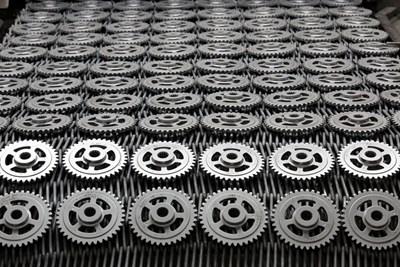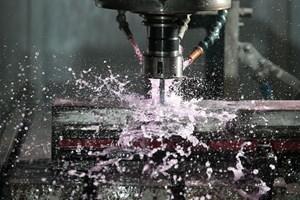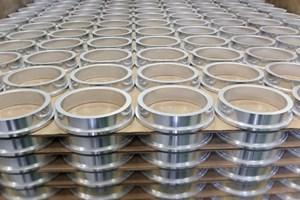What Are Powder Metallurgy Components?
 Powder Metallurgy (PM) components are made from metal powder via a metal-forming process utilizing a wide range of ferrous and non-ferrous materials. Metal powders are metal alloys that are processed into a very fine powder through atomization. The metal powder is then compressed using compaction presses and custom-designed tooling, creating a near net shape component. Once components are compacted to the desired specifications, the parts are sintered to achieve the final material specifications including hardness, tensile strength, and density. Powder metallurgy components (sometimes called powder metal components) are used in a wide variety of applications; ranging from automotive and off- highway vehicles, industrial and home appliances, firearms and sporting goods.
Powder Metallurgy (PM) components are made from metal powder via a metal-forming process utilizing a wide range of ferrous and non-ferrous materials. Metal powders are metal alloys that are processed into a very fine powder through atomization. The metal powder is then compressed using compaction presses and custom-designed tooling, creating a near net shape component. Once components are compacted to the desired specifications, the parts are sintered to achieve the final material specifications including hardness, tensile strength, and density. Powder metallurgy components (sometimes called powder metal components) are used in a wide variety of applications; ranging from automotive and off- highway vehicles, industrial and home appliances, firearms and sporting goods.
How is Metal Powder made? And how do we make Powder Metallurgy Components?
Beginning early in the design process MPP works with customers to create an efficient and cost-effective part design and select the right material. MPP is experienced in utilizing a wide range of ferrous and non-ferrous materials, including iron, stainless steel, copper, aluminum, and soft magnetic materials. When the application calls for a custom alloy, MPP’s metallurgical experts can design and simulate new metal alloys to meet customer requirements. All PM processes start with compaction, tooling is custom designed and built to fit the compaction press required for the component. A range of press tonnages are available to service both large and small components. Metal powder is then compressed, using several tons of force, to shape the powder to the part specifications. Once compacted, parts are moved to furnaces with strict temperature and atmosphere control to begin the sintering process. Sintering creates the molecular bonds between metal partials that ultimately create the structure of the part. After the part is sintered a variety of secondary operations can be used to achieve further tolerances.
Advantages of Powder Metallurgy Components
So why should a manufacturer convert from other metal-forming technologies to powder metallurgy components? There are many benefits to using powder metallurgy, but it all starts with the ability to create parts with extremely complex geometry utilizing a cost-effective process. The flexibility of the powder metallurgy process allows for the production of unique components with intricate design features while maintaining very tight tolerances.
Powder metallurgy also allows components to be made from unique alloys with tailored properties to match specific tolerances or performance requirements, such as operating wear resistance, corrosive environments, and high temperatures.
Unlike other metal-forming processes, powder metallurgy manufacturing eliminates many additional processes  resulting in lower final cost. The process allows for creation of uniform, consistent parts, this uses less energy, and creates little material waste. By manufacturing to a near net shape design metal waste is reduced while also reducing post-production processes. PM utilizes upwards of 97% of input material and is classified as a green technology in metal manufacturing.
resulting in lower final cost. The process allows for creation of uniform, consistent parts, this uses less energy, and creates little material waste. By manufacturing to a near net shape design metal waste is reduced while also reducing post-production processes. PM utilizes upwards of 97% of input material and is classified as a green technology in metal manufacturing.
Additional benefits of powder metallurgy and PM part manufacturing include:
- Reduced wear
- Improved corrosion
- Extraordinary geometry and tolerance capabilities
- Reduction of secondary operations
- Better quality control
- Versatility – A wide variety of composites, alloys, and other materials can be used during the PM sintering process
- Cost-effective, high volume manufacturing of complex or unique shapes
Manufacturing powder metallurgy components provides for high predictability and consistency of mechanical behavior for a wide range of applications, allowing for the creation of parts that would be simply infeasible to manufacture with competing manufacturing methods.
Metals Used in Powder Metallurgy Processes
Powder metallurgy components can be made from a variety of metals that can be blended to create alloys to achieve the desired material properties and characteristics for a particular application. Common metals used during the powder metallurgy process include:
- Iron and Steel
- Stainless steel
- Aluminum
- Copper and Bronze
- Soft Magnetic Composites
Applications and Uses of PM Components
So, what are powdered metal components typically used for? The short answer is “a whole lot.” A wide range of industries utilize components produced with the powder metallurgy process. Common applications of powder metallurgy include electromagnetic assemblies, structural parts, engine components, gears, bearings, and bushings.
Some of the most common industries that utilize powder metallurgy are:
- Automotive Components
- Electric Traction Motors (EVs)
- Electronics and Electrical
- Aerospace and Defense
- Heavy Truck and Off-Highway
- Power Transmission and Gears
- Fluid Power Products
- Home appliances
- Industrial Applications
- Firearms Components
- Orthodontics
- Construction
- Hardware
- Lawn and garden
Who Is Metal Powder Products (MPP)
Metal Powder Products (MPP) is the world’s largest industrial supplier of powder metallurgy components and an international provider of custom-engineered powder metallurgy solutions. MPP provides PM product solutions to customers in a variety of industries ranging from automotive to lawn and garden, off-highway to power tools, and electronics to sporting goods.
 MPP is a recognized industry leader in the supply of ferrous, aluminum, stainless steel, and soft magnetic composites and the world’s premier producer of structural aluminum powder metal (PM) components. MPP leads the way in the use of PM aluminum for a variety of new and existing applications and is an innovator in PM material technology, including the development, selection, and blending of a wide variety of standard and custom PM materials and alloys.
MPP is a recognized industry leader in the supply of ferrous, aluminum, stainless steel, and soft magnetic composites and the world’s premier producer of structural aluminum powder metal (PM) components. MPP leads the way in the use of PM aluminum for a variety of new and existing applications and is an innovator in PM material technology, including the development, selection, and blending of a wide variety of standard and custom PM materials and alloys.
MPP is also a leader in manufacturing technologies associated with the PM process. From our computer-controlled, multi-function presses and specially designed, high-temperature, sintering furnaces to our secondary operations facilities and innovative processes such as pm joining techniques, MPP has aggressively invested in equipment and programs to increase productivity and reduce costs.
Headquartered in Noblesville, Indiana, MPP is a leading global provider of custom-engineered powder metallurgy and metal injection molding (MIM) solutions for industrial applications. MPP provides complete design and engineering services from prototype through production, with eight production facilities in the U.S. and China specializing in the production of various components, including gears and sprockets, complex structural parts, high strength aluminum parts, and components requiring unique mechanical and physical properties, for use in high stress, wear and magnetic applications.
Contact MPP
Need assistance with your parts manufacturing or want to learn more about powdered metal components? Contact MPP today.
